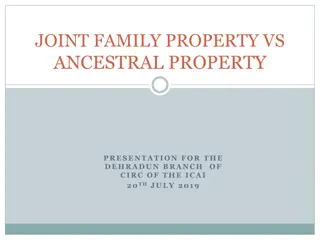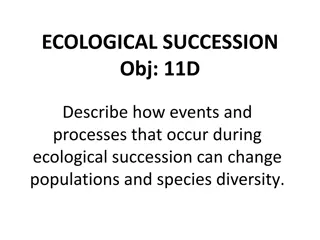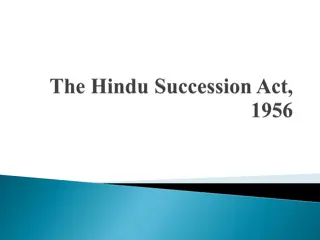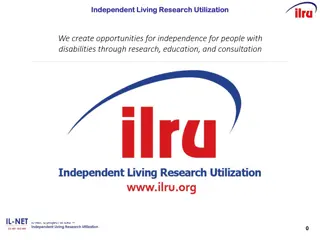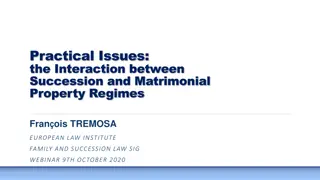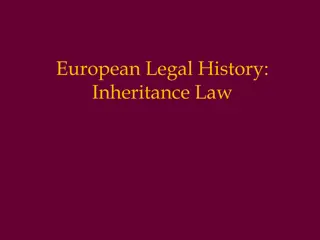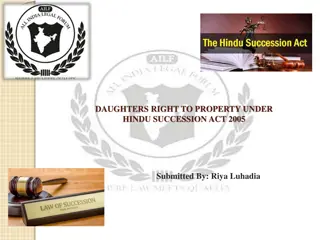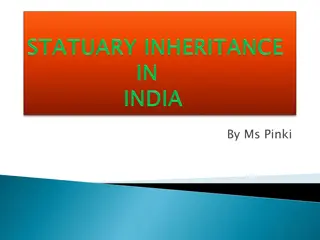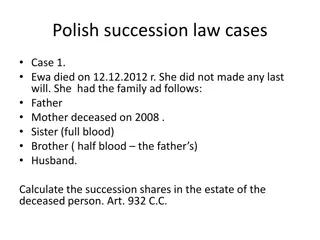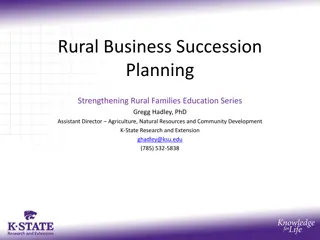
Understanding Succession Laws in Civil Code: Private Rights and Statutory Succession Explained
Discover the nuances of succession laws involving private rights and statutory succession as outlined in the civil code. Learn about the legal title to succession, rights and duties of heirs, and the distribution of property in various scenarios such as intestacy and disinheritance. Gain insights into the statutory succession groups and their entitlements, including children, spouse, parents, siblings, and more. Explore real-life examples to grasp the practical application of these laws.
Download Presentation

Please find below an Image/Link to download the presentation.
The content on the website is provided AS IS for your information and personal use only. It may not be sold, licensed, or shared on other websites without obtaining consent from the author. If you encounter any issues during the download, it is possible that the publisher has removed the file from their server.
You are allowed to download the files provided on this website for personal or commercial use, subject to the condition that they are used lawfully. All files are the property of their respective owners.
The content on the website is provided AS IS for your information and personal use only. It may not be sold, licensed, or shared on other websites without obtaining consent from the author.
E N D
Presentation Transcript
General rule: Succession includes private rights and duties do not includes public law obligations (criminal penalties, fines, administrative fees etc.) taxes legal act Ordynacja podatkowa provides that tax due pass upon the person sdeath on heirs accordind to civil law regulations
Title to succession Legal title to succession results from the law (civil code) or lastwill Statutorysuccession to the entire property takes place if there is no lastwill, it is invalid or none of the persons named in lastwill is ableorwants to be an heir Property is acquired by an heiron the oppening of the succession = the moment of death.
The heir is legally succeeding to all property of a deceased person, irrespective of whether such person died testate or intestate, and upon whom devolves as well as the rights the duties and liabilities attached to the estate An heir may be declared by a court unworthy to succeed crime against the deceased orcrime against lastwill A person who is not aliveat the time of opening the succession (moment of death) cannot be an heir. A child that has already been conceived can be an heir if it is born alive. A person may reject the successionwithin 6 months time. A person maywaive succession by a contract (notary form) with the succesor
Statutory succession - groups I children and spouse (1/4) equal shares. Grand children receive the share of a child if he/she does not live to opening of the succession II lack of children spouse (1/2) and parents (1/4 + ) III lack of children and spouse parents (1/2 + ) In casea parentdoes not live his shares goes to siblings in equal parts.
Example: John has died in 2013, his father has died in 2009. He has a motherand one sister (the same motherand father) and one brother from second marriage of his mother (the same motheronly). Calculateshares.
Statutory succession - groups IV no children, spouse, parentsand siblings grandparents (1/4 + +1/4 +1/4). V if grandparents does not live his share goes to his descendants in equal parts (uncle, aunt, or his /her children cousins) VI stepchild (child of the spouse if it is an orphant) Municipalityof the last place of residence Treasury
Applying the UE procedural regulations referring to matters of succession into Polish procedural law REGULATION (EU) No 650/2012 OF THE EUROPEAN PARLIAMENT AND OF THE COUNCIL of 4 July 2012 on jurisdiction, applicable law, recognition and enforcement of decisions and acceptance and enforcement of authentic instruments in matters of succession and on the creation of a European Certificate of Succession
I phase shares: Court - decision on establishing acquisition of inheritance or I phase shares: Notary notaryactestabilishing acquisition if the estate. = Coownership in shares II phase division of theestate contractual or juridicial




